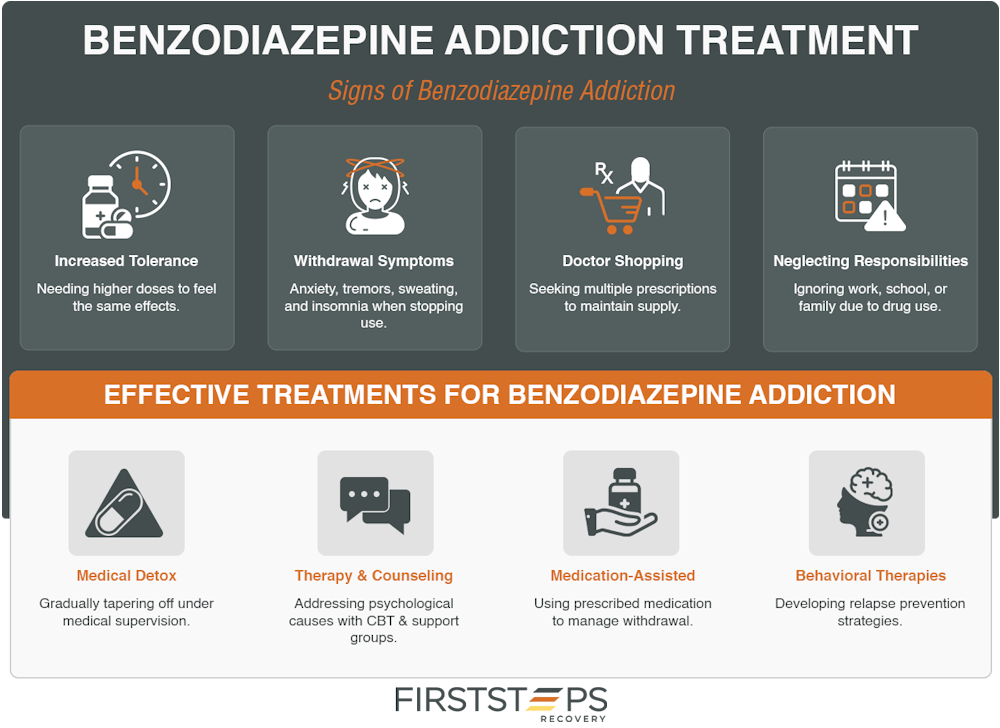Benzodiazepine addiction has become a significant concern globally, given its widespread impact. These medications, initially prescribed to alleviate anxiety and induce relaxation, carry a high risk of addiction that often leads individuals into dependency and misuse.
The substance abuse and mental health treatment programs at First Steps Recovery offer these services to help support recovery. From comprehensive detox programs to therapy addressing underlying psychological factors, various approaches exist to help individuals overcome benzodiazepine dependence. By emphasizing the importance of these treatments, those grappling with benzodiazepine addiction can access the support necessary to regain control of their lives and attain lasting sobriety.
At First Steps Recovery in Fresno County, we provide specialized benzodiazepine addiction treatment. Our facility offers comprehensive programs to address the root causes of addiction and foster healthy coping mechanisms. With personalized care and a supportive environment, we are committed to guiding individuals through their journey toward recovery and helping them build a solid foundation for a drug-free life.


Benzodiazepines are a class of drugs that are commonly prescribed to treat mental health conditions such as anxiety disorders and insomnia, as well as certain brain conditions like seizures. Although these drugs are frequently prescribed, there is a significant risk that an individual could develop an addiction.
Benzodiazepine addiction can arise when individuals misuse the drug for non-medical purposes, exceed prescribed doses, or use it for prolonged periods, leading to both physical and psychological dependency. This addiction can have detrimental effects on physical health, mental wellness, and overall functioning, often necessitating specialized treatment and support for recovery. Detoxification is the initial phase of transitioning away from benzodiazepine use and addiction towards sobriety.
Benzodiazepines carry a range of adverse effects on both the body and mind. They often induce sensations of lightheadedness, dizziness, and muscle weakness, while also potentially leading to blurred vision and confusion. Additionally, benzodiazepines are notorious for causing drowsiness, memory issues, and nausea.
In rare instances, benzodiazepines may trigger headaches, low blood pressure, tremors, double vision, rashes, and incontinence. Memory problems associated with benzodiazepines typically involve difficulty forming new memories, resulting in a sense of amnesia.
Long-term use of benzodiazepines can exacerbate issues such as difficulty concentrating, sluggishness, emotional detachment, and irritability. Managing these side effects can be challenging for many individuals, particularly due to the drugs’ addictive properties. This can make quitting without professional assistance extremely challenging.
Recognizing the signs can help in the early detection of benzodiazepine addiction, prompting individuals to seek suitable support and treatment. Signs of benzodiazepine addiction include:
Individuals may require higher doses over time to achieve the same effects, indicating a growing tolerance to the drug.
Constant preoccupation with obtaining and using benzodiazepines, which can lead to neglect of responsibilities and relationships.
Difficulty in controlling benzodiazepine use, despite awareness of its negative consequences on health, work, or relationships.
Withdrawal from social activities or relationships, as benzodiazepine use becomes the primary focus.
Continued use despite experiencing negative effects on physical or mental health, or after receiving warnings from healthcare providers.
Seeking multiple prescriptions from different doctors or engaging in illicit methods to obtain benzodiazepines.
Neglecting work, school, or familial responsibilities in favor of using benzodiazepines.
Spending significant amounts of money on acquiring benzodiazepines, leading to financial strain or hardship.
Displaying mood swings, irritability, or aggression, along with changes in sleep patterns and appetite.
Hiding or lying about benzodiazepine use, and avoiding discussions about the extent of their usage.
For individuals seeking treatment for benzodiazepine (benzo) addiction in Clovis, CA, First Step Recovery provides a range of options tailored to meet your needs.
Detoxification is typically the initial phase of benzo addiction treatment. Under the supervision of medical professionals, patients gradually taper off their benzodiazepine use to minimize withdrawal symptoms and safely manage the detox process. Medical assistance may be provided to alleviate discomfort during withdrawal.
Counseling and therapy play crucial roles in addressing the psychological aspects of benzo addiction. Patients engage in one-on-one counseling sessions or group therapy to explore the root causes of their addiction, learn coping mechanisms, and develop strategies to prevent relapse. Cognitive-behavioral therapy (CBT) is often employed to challenge maladaptive thoughts and behaviors associated with addiction.
Behavioral therapies complement counseling efforts by targeting specific behaviors linked to benzo addiction. Techniques such as motivational interviewing, contingency management, and relapse prevention are utilized to reinforce positive changes, enhance motivation for recovery, and build up relapse prevention strategies.
In some cases, medication may be prescribed to support the treatment process. During detoxification, longer-acting benzodiazepines like diazepam may be administered to manage withdrawal symptoms effectively. Additionally, medications such as selective serotonin reuptake inhibitors (SSRIs) or anticonvulsants might be prescribed to address co-occurring mental health disorders or alleviate anxiety symptoms.
It is important to note that the specific therapy or combination of therapies used to treat benzo addiction may vary depending on the individual’s needs and the severity of the addiction. Treatment should be customized to address the unique circumstances and challenges faced by each person seeking recovery.
After becoming addicted to benzodiazepines, detoxification is often needed to become sober. Withdrawal symptoms during detox vary based on factors like frequency and duration of use. These symptoms evolve during the detox process.
The initial phase of detox is often the toughest. The body must adjust to the absence of benzodiazepines, leading to various physical and psychological withdrawal symptoms. While these symptoms aren’t usually life-threatening, detox should be supervised by a medical professional for safety and comfort. Common symptoms include panic attacks, anxiety, tremors, muscle pain, headaches, sweating, heart palpitations, and occasionally seizures.
In the early stages of detox, clients experience withdrawal symptoms that may be alleviated with medication. As physical symptoms subside, psychological symptoms become more prominent. Strong cravings are common, requiring support from treatment staff and medical professionals to prevent relapse. Withdrawal symptoms diminish over time with continued abstinence.
Upon completing the detox program, clients can participate in various forms of therapy. Individual and group therapy can help them explore the root causes of their benzodiazepine dependence and connect with others facing similar challenges. Experiential therapies are also available to promote holistic healing of the mind and body.

The duration of benzodiazepine detox varies depending on factors like the potency of the drug, frequency of use, and duration of use. Compared to detoxing from other substances, benzodiazepine detox programs can vary greatly in length. Withdrawal symptoms usually start within 24 hours of the last dose and can persist for days or months. Some individuals may experience prolonged withdrawal symptoms beyond the typical duration.
Many different treatment programs are available to clients who wish to detox from benzodiazepines. In outpatient detox, patients slowly decrease their benzodiazepine dose over weeks or months under the supervision of healthcare providers, visiting a clinic regularly for adjustments. In cases of severe dependence or complex withdrawal symptoms, inpatient detox provides close monitoring and medical support in a hospital or detox facility.
The tapering schedule, tailored to individual needs, involves gradually reducing the dose, often by a small percentage weekly. This may also involve transitioning to a longer-acting benzodiazepine before tapering off completely. Substitution therapy may involve switching to a longer-acting benzodiazepine like diazepam (Valium) to ease withdrawal symptoms. Additionally, healthcare providers may prescribe medications (such as sedatives, antidepressants, or anticonvulsants) to manage specific withdrawal symptoms like insomnia, anxiety, or seizures.
At First Step Recovery in Clovis, CA, we focus on personalized care for benzodiazepine detox. Our expert team tailors treatment plans to each person’s needs, offering intensive outpatient, residential treatment options, and family therapy for addiction for a safe detox. Throughout the process, we manage withdrawal symptoms with medications and therapies to ensure comfort and safety. Our goal is to support individuals through detox for lasting recovery and wellness.
Recognizing whether benzodiazepine detox may be right for you involves considering various factors related to your benzodiazepine use, health, and overall well-being.
Detox may be right for you if the following reasons are relevant to your situation:
If a doctor or specialist suggests benzodiazepine detox based on your personal medical situation, it’s worth considering their advice.
At First Step Recovery in Clovis, CA, our benzo addiction treatment involves a personalized approach tailored to each individual’s needs. Our program includes a combination of therapy, counseling, support groups, and medical supervision to help individuals safely detox from benzodiazepines and manage withdrawal symptoms. Additionally, we provide education on addiction, coping strategies, and relapse prevention techniques to support long-term recovery. Our compassionate team is dedicated to guiding individuals through every step of the recovery process with care and support. To learn more about our programs, contact us!

From our certified therapists and nurses to our emotional support animal "Cooper", our entire team is dedicated to the health and success of our clients throughout our program and beyond.
Have questions about how our treatment programs works? Let's talk.
Experience the benefits of our alcohol detox treatment at First Steps Recovery.
First Steps Recovery can help you find lasting sobriety from benzodiazepines.
Fentanyl is one of the most common causes of drug overdose in the United States today. Help end your addiction with First Steps Recovery.
When you're ready to end your methamphetamine addiction, we're here for you at First Steps Recovery.
Have questions about our substance abuse treatment programs? Let’s talk.
Dayatra L.
Melissa B.
Bruce G.
Have questions about how our alumni program works? Let's talk.










Have questions about First Steps Recovery? We're here to help.
© Copyright 2023 • First Steps Recovery • All Rights Reserved